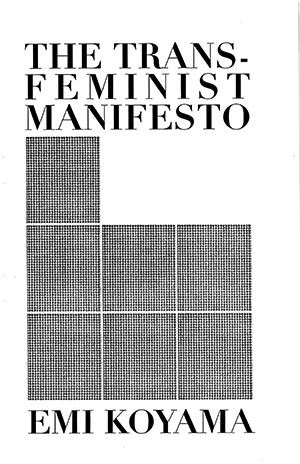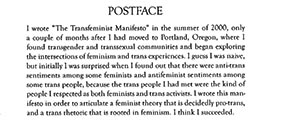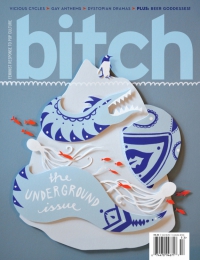This past week, I visited New York City to present “Erasure of Transgender Youth in the Sex Trade” at an NYU Law symposium on transgender law. While I was there, I went to Occupy Wall Street and spoke with people at Queering OWS table, who showed me a draft copy of “radical language road guide” for other OWS participants to understand queer and trans terminologies. Many of the definitions were problematic, so I promised to write what I think should be changed. Below is what I thought the “language road guide” should consider.
I live in Oregon, but visited NYC this past week to give a presentation at NYU symposium on transgender law. While in NYC, I was able to come to OWS and spoke with someone about the problems with the draft version of “Radical Language Road Guide.” I agreed to write my recommendations to make the guide better, so here it is.
GENERAL COMMENT
People often get hang up on understanding terminologies to avoid appearing offensive to people, like when a white person gets obsessed about whether to call someone Black or African American or something else. But the important part should be to respect how someone identifies, and actively engage in resistance to systems of oppressions, rather than simply learning how to appear “sensitive.” It would not be a “radical” guide if it doesn’t stress that. I think respecting each person’s self-defined ways of identifying and expressing themselves is more than just recognizing fluidity.
Now to the specific term…
“ASEXUAL”
AVEN (Asexual Visibility and Education Network) defines an asexual as “someone who does not experience sexual attraction.” It is wrong to define it as a matter of (lack of) expression of sexuality or sexual preference.
“CISGENDERED”
Similar to “transgendered,” the acted-upon construction should be avoided. “Cisgender” is preferable. Also, this definition may not be clear to many folks, so I suggest adding that it means someone who is not transgender.
“GENDER NON-CONFORMING”
The definition (“an individual who doesn’t qualify or conform to any gender identity”) is wrong, because someone who clearly identify with and conform to a third gender would be considered “gender non-conforming” from the perspective of gender binary. Perhaps you meant to say “an individual who doesn’t qualify or conform to male and female gender roles and identities.”
“GENDER PRONOUN”
As pointed out in the general comment above, this should stress the importance of respecting others’ self-determined gender pronouns, rather than giving examples of alternative pronouns. My experience is that a lot of cis people want to learn about all the exotic pronouns but supplying them with such list is a distraction.
“HOMONORMATIVE”
Let’s be honest and just say that this is something that is cultivated by gays and lesbians. It is true that bisexual and transgender communities also hold their versions of normative standards (i.e. appropriate ways to be bisexual or transgender), but much of what bisexual and transgender people are facing are homonormative prescriptions coming from gay and lesbian communities.
“INTERSEX”
Intersex is not about “gender expressions,” but any of the many medical conditions that result in internal or external reproductive and sexual anatomies that are different from most males and females.
“POST-OP”, “PRE-OP”, “NON-OP”
Providing definitions for these terms without contexualizing them give the false impression that it is okay to talk about these topics. These terms either don’t belong in the “radical” terminologies, or simply declared “none of your fucking business.”
“TWO SPIRITED”
So wrong and offensive. First, it’s “Two Spirit.” Second, it is not a term referring to a “concept,” but actual indigenous people who live as Two Spirit, and that should be stressed to avoid cultural appropriation of their identities by colonizers. It should also be noted that “Two Spirit” is not a traditional term within First Nations communities, but a term invented by indigenous people in order to describe a whole series of gender and sexual categories that exist among many different cultures and communities that have been considered by colonizers as abnormal, as well as those identities that were created by contemporary indigenous queers and trans people beyond their traditions under the colonial rule.
“SEX POSITIVITY”
I have an issue with this concept, because it frequently functions as part of the homonormative discourse. How about rephrasing it to say that “an individual should be allowed to live in an environment that fosters pride in” their sexualities and gender identities, rather than that an individual “should be proud”?
Good luck QOWS people!
One more comment re “TRANSGENDERED”:
The term “transgendered” (as opposed to more appropriate “transgender” as an adjective) has always been offensive, but it is more so now that anti-trans “radical feminists” have adopted this as their terminology of choice.
The “radical feminists” have referred to sex workers regardless of their circumstances as “prostituted women” in order to deny women’s (and others’) agency and resilience in doing whatever it takes to survive and to categorically classify them as powerless victims. Over the last couple of years, they have began to use “transgendered” in a similar construction to suggest that trans people are manipulated and victimized by the society and the medical industrial complex into accepting transgender medical treatments, and should not be treated as individuals capable of speaking for themselves.
Worse, they use the term “transgendered men” to refer to male-to-female transgender persons (i.e. trans women) and “transgendered women” to refer to female-to-male transgender persons, because they reject people’s self-defined gender identities. To them, a “transgendered man” (i.e. trans woman) is a man who has been wrongly manipulated into believing that “he” is a woman, and “he” should be helped to recognize this act of “violence.”
In the past, use of the term “transgendered” instead of “transgender” was just annoying. But now, it is part of the vocabulary of clearly hostile people and movement that wishes to “morally mandating it out of existence” (Janice Raymond, “The Transsexual Empire: The Making of the She-Male”) and all trans allies must abandon it.
Note: Someone commented on facebook that it wasn’t fair that I group all radical feminists and suggest that they are all anti-sex worker and anti-trans. Below is my response.
You might want to read the exchange between pro-sex, pro-kink sex worker feminist Lori Adorable and her “radical feminist” critics. Lori said that she views herself as a radical feminist because she believes that “there is structural oppression of women and that radical everyday actions that undermine traditional gender roles can undo this large-scale, structural oppression.”
http://loriadorable.wordpress.com/2011/08/07/in-which-i-finally-respond-to-the-youre-not-a-real-radfem-thing/
For writing this, she was however ridiculed and dismissed as “just making it up” what it means to be a radical feminist. A comment on her blog states that “I believe you are a feminist. But I do not believe you are a radical feminist. A liberal feminist, sure. But not radical.”–which is a typical response from other radical feminists. See for example:
http://www.feminisms.org/3130/radical-feminism-just-making-it-up-as-we-go-along/
As someone who have studied feminist theory, I tend to agree with these (majority) radical feminists’ own definition of radical feminism: it is a version of feminism deeply rooted in the belief in the primacy of patriarchy and men’s subjugation of women over all other oppressions. Other oppression may be tools of men’s domination over women, but are viewed as subsystems of patriarchy.
Now, the reality is that not everyone who identifies as “radical feminist” agrees with this definition, including your friend and Lori. I agree that we need to acknowledge diversity of opinions among people who identify as “radical feminists,” but I feel that it would be disingenuous to pretend that radical feminism at the very fundamental level is not racist, classist, transphobic, etc. due to its fundamental assumption in the primacy of patriarchy over all other oppressions. I am talking not about radical feminists, who might take the label for whatever reasons, but radical feminism as a theoretical standpoint with a specific history and tradition.
Individual radical feminists might be able to reconcile pro-sex worker or pro-transgender stances with radical feminism, as I have done in the past (see my 2001 article, The Transfeminist Manifesto in “Catching a wave: reclaiming feminism for the 21st century” as an example). Even Andrea Dworkin has written something supportive of trans women, which is completely forgotten by many of her fans. But that doesn’t negate the overwhelming weight of the history and tradition of radical feminist thought.
Also, for what it’s worth I did clarify that I was referring to “anti-trans ‘radical feminists’,” not just any “radical feminists,” precisely because I know I myself have been a pro-trans “radical feminist” in the past.




